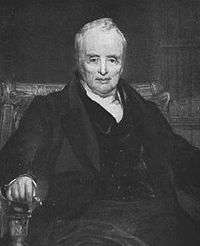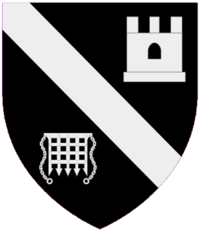William Plunket, 1st Baron Plunket
William Conyngham Plunket, 1st Baron Plunket, PC (Ire), QC (1 July 1764 – 5 January 1854) was an Irish politician and lawyer. He served as Lord Chancellor of Ireland between 1830 and 1834 and again between 1835 and 1841.
The Lord Plunket KC PC | |
|---|---|
 Lord Plunket. | |
| Lord Chancellor of Ireland | |
| In office 23 December 1830 – November 1834 | |
| Monarch | William IV |
| Prime Minister | The Earl Grey The Viscount Melbourne |
| Preceded by | Sir Anthony Hart |
| Succeeded by | Sir Edward Sugden |
| In office 30 April 1835 – 1841 | |
| Monarch | William IV Queen Victoria |
| Prime Minister | The Viscount Melbourne |
| Preceded by | Sir Edward Sugden |
| Succeeded by | Sir John Campbell |
| Personal details | |
| Born | 1 July 1764 Enniskillen, County Fermanagh |
| Died | 5 January 1854 (aged 89) County Wicklow |
| Nationality | British |
| Political party | Whig |
| Spouse(s) | Catherine MacCausland |
| Alma mater | Trinity College Dublin |
Background and education
The son of a Presbyterian minister, Reverend Thomas Plunket of Dublin, and his wife Mary (née Conyngham),[1] Plunket was born in Enniskillen, County Fermanagh, and educated at Trinity College Dublin. After graduating in 1784, he was admitted as a student at Lincoln's Inn, and was called to the Irish bar three years later.
Legal and political career
Plunket was made a King's Counsel in 1795, and three years later was elected to the Irish House of Commons as a Member of Parliament for Charlemont. After the Act of Union was passed, Plunket lost his seat, and failed to be elected to Westminster for the University of Dublin in 1802, but he subsequently became Solicitor-General for Ireland in 1803, a post he held for two years before becoming Attorney-General for Ireland, again for two years. He was appointed a member of the Privy Council of Ireland on 6 December 1805. As Solicitor General he was one of the Irish officials singled out for attack in a serious of scurrilous letters published under the name "Juverna". The author was soon discovered to be Robert Johnson, judge of the Court of Common Pleas (Ireland). Johnson was prosecuted for seditious libel, convicted and forced to resign from the Bench in disgrace.
In January 1807, he was returned to British House of Commons as a Whig member for Midhurst, representing the constituency for only three months, although he subsequently returned to the House of Commons in 1812 as the member for Dublin University, a seat which he continued to represent until May 1827.
In 1822 he was reappointed to the office of Attorney-General for Ireland because William Saurin (Attorney General 1807–22) was implacably opposed to Catholic Emancipation, which the Crown now accepted was inevitable. Plunket, unlike Saurin, supported Emancipation and was able to work in reasonable harmony with Daniel O'Connell to secure it.
In 1827, relinquishing his seat in the House of Commons, he was raised to the Peerage of the United Kingdom as Baron Plunket, of Newton in the County of Cork[2] and was appointed Chief Justice of the Irish Common Pleas.
He was an advocate of Catholic Emancipation,[3] and served as Lord Chancellor of Ireland from 1830 to 1841, with a brief interval when the Tories were in power between 1834 and 1835. He was forced into retirement to allow Sir John Campbell to assume office.
His tenure as Chancellor was not without controversy: opponents accused him of political partisanship, lengthy absences from work, and nepotism on a scale unusual even in an age when it was understood that office holders took care of their relatives.
Family
Plunket was married to Catherine McCausland, daughter of John McCausland of Strabane and Elizabeth Span, daughter of Reverend William Span of Ballmacove, County Donegal.[4] Their son Thomas became Church of Ireland Bishop of Tuam, Killala and Achonry. Thomas's eldest daughter the Honourable Katherine Plunket (1820–1932) was the longest-lived Irish person ever. Their other children included sons Patrick (died 1859) and Robert (Dean of Tuam from 1850), and a daughter, Louisa.[5] In Dublin, Plunket was a member of Daly's Club.[6] He died in January 1854, aged 89, at his country house, Old Connaught, near Bray, County Wicklow, and was succeeded in the barony by his eldest son, Thomas.
He lived in considerable state: Sir Walter Scott, who visited him at Old Connaught, left a glowing tribute to Plunket's charm and hospitality, and the excellence of his food and wine.
  |
|
References
- The Peerage Of The British Empire, 27th Edn, 1858, Edmund Lodge Esq, accessed 25 December 2008
- "No. 18356". The London Gazette. 27 April 1927. p. 937.
- On Catholic Relief, speech delivered on 28 February 1821 by Plunket in the House of Commons, adjudged by Sir Robert Peel as "it stands nearly the highest in point of ability of any ever heard in this House", accessed 24 December 2008
- A Genaeologyical and Heraldic History of the Commoners of Great Britain and Ireland: MacCausland of Strabane Vol II, John Burke Esq, 1836, accessed 24 December 2008
- The Peerage, Baronetage, and Knightage, of Great Britain and Ireland, for 1860, Robert P. Dod Esq, 1860, accessed 25 December 2008
- T. H. S. Escott, Club Makers and Club Members (1913), pp. 329–333
- Burke's Peerage. 1850.
External links
| Wikisource has original works written by or about: William Plunket, 1st Baron Plunket |
- Hansard 1803–2005: contributions in Parliament by William Plunket
| Parliament of Ireland | ||
|---|---|---|
| Preceded by Richard Mountney Jephson Viscount Caulfeild |
Member of Parliament for Charlemont 1798 – 1801 With: Richard Mountney Jephson 1798 Francis Dobbs 1798–1801 |
Succeeded by Parliament of the United Kingdom |
| Parliament of the United Kingdom | ||
| Preceded by John Smith William Wickham |
Member of Parliament for Midhurst 1807 With: Henry Watkin Williams-Wynn |
Succeeded by Samuel Smith James Abercromby |
| Preceded by John Leslie Foster |
Member of Parliament for Dublin University 1812–1827 |
Succeeded by John Wilson Croker |
| Legal offices | ||
| Preceded by James McClelland |
Solicitor-General for Ireland 1803–1805 |
Succeeded by Charles Kendal Bushe |
| Preceded by Standish O'Grady |
Attorney-General for Ireland 1805–1807 |
Succeeded by William Saurin |
| Preceded by William Saurin |
Attorney-General for Ireland 1822–1827 |
Succeeded by Henry Joy |
| Preceded by John Toler, 1st Earl of Norbury |
Chief Justice of the Irish Common Pleas 1827–30 |
Succeeded by John Doherty |
| Political offices | ||
| Preceded by Sir Anthony Hart |
Lord Chancellor of Ireland 1830–1834 |
Succeeded by Sir Edward Sugden |
| Preceded by Sir Edward Sugden |
Lord Chancellor of Ireland 1835–1841 |
Succeeded by Sir John Campbell |
| Peerage of the United Kingdom | ||
| New creation | Baron Plunket 1827–1854 |
Succeeded by Thomas Plunket |